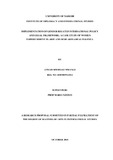| dc.description.abstract | To establish the level of implementation of gender related international policy and
legal framework in respect to women empowerment in arid and semi arid areas in
Kenya. The study sought to achieve the following specific objectives: to determine
the extent to which implementation of gender related international policy and legal
framework in ASAL areas in Kenya has achieved economic empowerment in ASAL,
to find out the extent to which implementation of gender related international policy
and legal framework in ASAL areas in Kenya has achieved educational empowerment
in ASAL, to investigate the extent to which implementation of gender related
international policy and legal framework has achieved political leadership
empowerment in ASAL and to investigate the extent to which implementation of
gender related international policy and legal framework has reduced sexual and
gender-based violence in ASAL. This study used a descriptive research design. Due to
an arid climate, Isiolo County, North East Kenya was considered an ideal research
location. The study use secondary data. Secondary data was sourced from a collection
and review of published and unpublished material, journals, academic papers and
periodicals. The study was also based on analysis of reports by governmental and
non-governmental organizations and other documents on the women‘s movement,
conventions, agreements and other instruments in Kenya. The study found that there
was coherence in how the gender related international policy and legal framework
interpret the concepts gender mainstreaming and empowerment. Framework
agreements set the agenda in development cooperation work in today‘s international
development empowerment is a concept of great importance in Kenya. The study
recommends that can women in ASAL areas are empowered economically. This study
recommends that barriers to female entrepreneurship should be removed and
promotes inclusive financial services and trade policies. Private sector development
should support female entrepreneurs by removing the barriers to the development of
women-owned enterprises. Female-owned enterprises produce positive economic and
social outcomes, enhancing women‘s self-confidence, increasing their participation in
household and economic decisions and contributing to their economic empowerment. | en_US |

